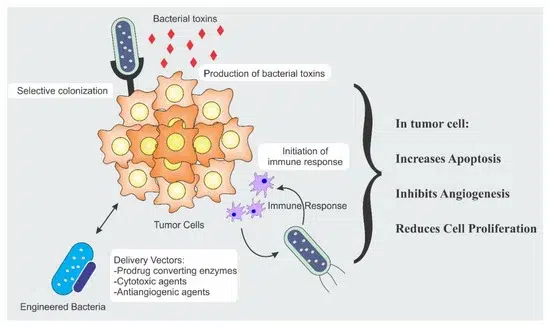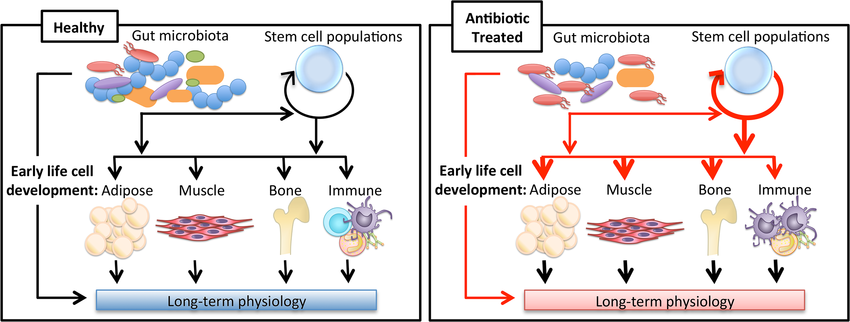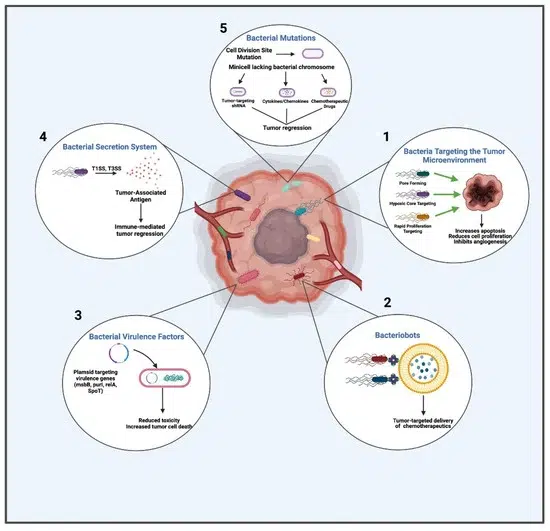Engineered Bacteria Take Aim at Cancer
Scientists have been investigating how microorganisms could transform a number of industries, including medicine, for decades. Programmable bacteria have become a ray of hope in the fight against cancer among these exciting new directions. With the ability to deliver targeted therapies directly to tumour sites while minimising damage to healthy tissues, these genetically engineered microbes have the potential to revolutionise the treatment of cancer.

Table of Contents
Making Use of Nature’s Accuracy (Engineered Bacteria Take Aim at Cancer )
Often called “living medicine,” programmable bacteria are created to carry out particular functions inside the human body. Scientists are able to direct these bacteria to seek out and engage with cancer cells through genetic modification, serving as tiny drug delivery systems. Comparing this tailored approach to traditional cancer treatments reveals a number of benefits.
Precision Targeting: Programmable bacteria can be trained to identify and target particular tumour markers, in contrast to conventional chemotherapy or radiation, which can harm both healthy and malignant cells. This accuracy increases the effectiveness of treatment and lowers the possibility of side effects.
Improved Drug Delivery: Bacteria are able to get to even the most difficult-to-reach tumour sites by navigating through complex biological environments. They can then maximise drug concentration and reduce systemic exposure by releasing their therapeutic payload straight into the tumour.
Self-Amplifying Therapy: The therapeutic effect can be amplified by the number of bacteria that multiply within the tumour due to programming. This self-sustaining system can deliver drugs continuously, lengthening treatment times and enhancing results.

New Therapies
Engineered Bacteria Take Aim at Cancer
Research on programmable bacteria as a cancer treatment is progressing quickly, and various exciting strategies are being developed. Among them are a few of these:
Bacteria that kill tumours: Certain bacteria have been engineered to carry toxins or enzymes that specifically target and kill cancer cells.
Bacteria used in immunotherapy can be engineered to boost the immune system’s attack on cancerous cells.
Gene therapy bacteria: Bacteria have the ability to transfer gene therapy constructs, which change the genetic composition of cancer cells to either increase their susceptibility to treatment or stop their growth.

Obstacles and Prospects for the Future
Engineered Bacteria Take Aim at Cancer
Even though programmable bacteria have a lot of potential, obstacles need to be removed before they are frequently used in clinical settings. The possibility that bacteria may spread from the tumour site and infect healthy tissues is one thing to be concerned about. More investigation is also necessary to guarantee the bacteria’s uniform delivery and effectiveness across various tumour types.
Engineered Bacteria Take Aim at Cancer: The application of programmable bacteria in oncology appears bright even in spite of these obstacles. Scientists are creating creative solutions to these issues and improving the application of these living medications as their research progresses. Programmable bacteria have the potential to completely transform cancer treatment by providing patients with a less invasive, more customised, and effective therapeutic option with continued advancements.
Advantages:
Accurately locating cancer cells: It is possible to use programmable bacteria that can identify and attach to tumour cells only, causing the least amount of harm to healthy tissues and minimising adverse effects.
Improved drug delivery: Bacteria are able to enter even the most difficult-to-reach tumour sites and release therapeutic payloads straight into the tumour by navigating complex biological environments.
Self-replication and long-term therapy: Programmable bacteria have the ability to multiply inside of tumours, increasing their population and enabling longer-term drug delivery, which may enhance treatment outcomes.
Flexibility and adaptability: Programmable bacteria provide a versatile platform for cancer treatment because they can be designed to carry a wide range of therapeutic agents, such as toxins, enzymes, gene therapy constructs, and immunostimulatory molecules.

Adverse Reactions:
Engineered Bacteria Take Aim at Cancer
Possibility of off-target effects: Despite their accuracy, programmable bacteria run the chance of unintentionally targeting healthy tissues and causing undesirable side effects.
Immune response and clearance: Engineered bacteria may be recognised by the body’s immune system, which could limit their efficacy and necessitate repeated administration.
Possibility of genetic modification of healthy cells: If bacteria accidentally transfer their therapeutic genes to healthy cells, there is a theoretical risk that gene therapy techniques will change the genetic composition of healthy cells.

Uncertainty about long-term effects: Before programmable bacteria are widely used in clinical settings, their long-term effects on human health must be carefully assessed.
In brief, the utilisation of programmable bacteria presents a promising avenue for cancer therapy, with various potential benefits over conventional approaches. These modified microbes are able to precisely target and deliver therapeutic agents to tumour cells while causing the least amount of damage to healthy tissues by exploiting the innate precision and adaptability of bacteria. For cancer patients, this targeted approach may result in reduced side effects, increased treatment efficacy, and a more individualised, minimally invasive therapeutic option.
Engineered Bacteria Take Aim at Cancer:Research in this field is moving quickly forward, even though there are still obstacles to be solved before programmable bacteria can be extensively used in clinical practise. These obstacles include ensuring bacterial stability, preventing off-target effects, and minimising immune responses. Programmable bacteria hold the potential to completely transform cancer treatment with further development, providing hope that cancer will eventually become a chronic, manageable condition rather than a fatal illness.


